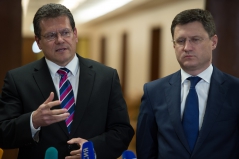EU Ready to Relaunch Trilateral Gas Talks
The European Commission (EC) has told senior Ukrainian politicians that it is ready to relaunch trilateral gas talks involving Russia, Ukraine and the EC.
Maros Sefcovic, EC vice-president for Energy Union (or in other words, European energy security) was in Kiev on September 2 and met Ukraine’s prime minister Volodymyr Groysman and energy minister Ihor Nasalyk among others.
"We want to re-launch the successful trilateral format of gas talks,” said Sefcovic, adding it had proven its usefulness in the past: “Russia as an exporter, Ukraine as a transit country and the EU as the main importer share a common interest of predictability.”
For the past two winters, such trilateral talks led to the agreement of a ‘Winter Package’ that, among other things, guaranteed Russian supplies and Ukrainian transiting of gas to the EU. This March, Russian gas giant Gazprom and Ukraine’s Naftogaz agreed to extend the package’s conditions until the end of June 2016.
One complication is that a final arbitration ruling between Gazprom and Naftogaz at the Arbitration Institute of the Stockholm Chamber of Commerce has been delayed, possibly until spring 2017. The two state-run companies are suing each other over the gas price, transit fees and transit volumes
Sefcovic and Russian energy minister Alexander Novak are in contact to arrange a meeting “in the coming weeks” at which the possible resumption of the trilateral gas talks will be a point on the agenda, indicated an EC spokesperson, although a date has yet to be fixed. Sefcovic is “fairly confident” that officials on the Ukrainian side are willing to resume the trilaterals, although things should become clearer once the EU and Ukraine shortly sign a memo of understanding on energy cooperation.

EC energy security commissioner Maros Sefcovic (left) hopes to meet Russian energy minister Alexander Novak "in the coming weeks"; they are shown here after a previous meeting in January 2015 (Photo credit: YouTube)
An EC September 2 statement noted it is “prepared to support the establishment of the corresponding [Ukrainian] Energy Efficiency Fund before the end of this year.”
In the same statement, Sefcovic welcomed the Ukrainian government decision in July to unbundle state gas supplier Naftogaz: “It is now important to implement this decision swiftly and consistently in the months ahead. In parallel, Ukraine's potential in the field of energy efficiency and renewable energy is huge: Were Ukraine to manage to increase its energy efficiency levels to the EU average level, the savings achieved would be greater than the energy consumption of Spain over a whole year. Ukraine could thus even become an exporter of energy."
The proposed plan, implementing the government’s unbundling decision, suggests that gas transmission assets will be transferred from Naftogaz to a new standalone TSO (transmission system operator) only after the final arbitration ruling is issued in Stockholm.
Naftogaz accused Gazprom early last month of under-delivering transit gas volumes, which meant that it had to compensate by topping up flows and bearing the cost itself. This happened, it said, despite a significant increase in volumes supplied in 1H 2016 by Gazprom to customers in the west. Gazprom has not replied to NGW's requests for comment.
In other news, Naftogaz said late September 2 it will fully restore Russian gas flows to the Balkans by September 3. On August 29 it had said that its TSO subsidiary Ukrtransgaz found a fault near its border with Moldava, requiring eight days of repair work during which flows to Balkan countries would be reduced temporarily from 40 to 18 mn m³/d because a 12-km section of the pipeline using a line valve located in the territory of Moldova would have to be isolated. In its update on September 2, it said the work had been completed in four days, twice as quickly as expected.
Naftogaz also said August 29 it had secured an extension of the project submission deadline, under the $3.65bn loan agreement with the China Development Bank, until 25 December 2017 following talks in Kiev with Chinese officials the previous week.
Mark Smedley


